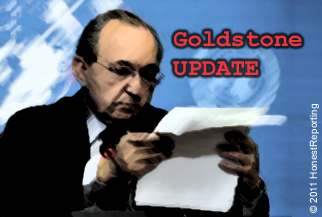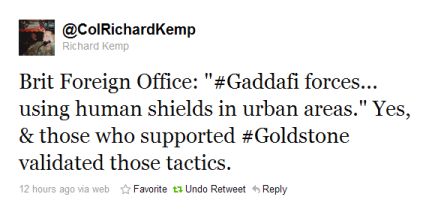Battle Over Goldstone Report Continues

In his original report, Goldstone wrote that Israel and Hamas were both guilty of war crimes and possibly crimes against humanity in the Gaza War. One of the most serious charges leveled against Israel was that it intentionally targeted Palestinian civilians. The charge, Goldstone wrote last week, was wrong. While Goldstone did not fully repudiate his report, he acknowledged there were flaws.
Although the story never reached the scale that had accompanied the publication of the Goldstone Report in 2009, virtually every media outlet covered Goldstone’s about-face fairly, if less dramatically.
A portion of the press, however, remains immersed in the question of what Goldstone’s reconsiderations mean for the fate of the Goldstone Report. After all, if relevant information has emerged that wasn’t considered when the report was published, it would be reasonable to expect its authors to review the material and make any necessary adjustments.
The Chicago Tribune, for example, wrote:
The UN should formally retract the Goldstone report. But it can’t stop there. The UN needs to acknowledge that it has not been an honest broker in the Middle East. It needs to acknowledge that its human rights panel continues to be an embarrassment that greatly undermines the standing of the world body.
It would be reasonable, that is, if the goal of a UN report were truth. It’s not reasonable at all, however, if the goal is to vilify Israel and use the Goldstone Report to further an agenda of Israel’s delegitimization.
Sadly, some of the report’s biggest cheerleaders before Goldstone declared his reconsiderations have become its biggest defenders today.
Former UN special rapporteur John Dugard, a longtime Israel critic who has often invoked the charge of apartheid against Israel, claimed that Goldstone failed to bring any new facts to the debate that would necessitate a review at the UN. Writing for the New Statesman, he wonders how Goldstone could even question that Israel set out to harm Palestinian civilians intentionally.
In his op-ed, Goldstone declares that Hamas’s indiscriminate firing of rockets into Israel, which resulted in the killing of four civilians, was an “intentional” targeting of civilians and consequently a war crime. But it is a mystery how he can suggest that the indiscriminate bombing and shooting of Palestinians in Gaza by the IDF, which resulted in nearly a thousand civilian deaths, was not “intentional”.
It is also a mystery how Dugard arrived at his total of nearly a thousand civilian deaths. Ironically, Goldstone himself, in the same op-ed, noted that even Hamas has conceded that the casualty figures were in line with the IDF’s totals.
Dugard also ignores the issue of human shields, or Hamas terrorists firing from behind Palestinian civilians. The following video taken during Operation Cast Lead demonstrates how Hamas used endangered the lives of Palestinian children, using them as human shields.
What may have been reported in the Goldstone Report as indiscriminate bombing may, in fact, have been completely different.
Former British army Col. Richard Kemp, who had testified before the Goldstone Commission to dispute charges of war crimes against Israel, recently noted that the Goldstone Report’s failure to properly address the use of human shields by Hamas has justified the same tactic in Libya.
Dugard wasn’t alone in dismissing Goldstone’s reversal as irrelevant to the substance of the Goldstone Report. In an editorial, The Guardian also noted that Israel’s intentions toward Palestinian civilians were beside the point.
The report did not in fact claim that Israel set out deliberately to murder civilians. It said that Operation Cast Lead was “deliberately disproportionate” and intended to “punish, humiliate and terrorize”. That charge stands unanswered. Indiscriminate warfare, as opposed to deliberate killing, was undoubtedly state policy.
This accusation by the Guardian was addressed by HonestReporting editor Yarden Frankl on Backspin, HR’s daily blog:
One might think that such an admission by the report’s chief author would cause the Guardian to reevaluate its position. But no, instead of blaming Israel for the intentional killing of civilians as a matter of policy, it now blames Israel for indiscriminate killing of civilians as a matter of policy.
Yet the Guardian offers no new evidence for this accusation, merely pointing back at the original flawed and debunked report. The editorial presents a list of accusations as facts. Yet these accusations are lacking both credibility and context. A full treatment of every one of the accusations based on Israel’s investigation has been published online. In certain cases, the investigations found the individual soldiers had acted against standing orders. But the vast majority of incidents were found to have been performed based on military need and done so in a way to limit civilian casualty and damage as much as possible.
While the credibility of the Goldstone Report has been challenged by the Goldstone’s reversal, the report remains a central document in the effort to challenge Israel’s moral authority and its very legitimacy. Unmitigated public pressure helped push Goldstone to reconsider his conclusions. It is vital to maintain the pressure to push Goldstone to take the next step and demands that the Goldstone Report be annulled or amended to reflect the truth.
Source material can be found at this site.











